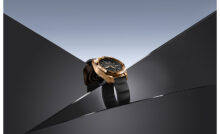A look at the inner workings of Breguet haute horlogerie
Creativity, innovation and impeccable aesthetics are once again the keynotes of the prestigious models unveiled by Breguet at Baselworld.
Loyal to its history, Breguet honours its founder’s broad range of competencies that proved of ample benefit to watchmaking as well as to navigation and astronomy.
Elected a member of the Bureau des longitudes in Paris, and then chronometer maker to the French Royal Navy and a member of the French Academy of Science, A.-L Breguet conceptualised and developed in the course of his career a wealth of spectacular timepieces including astronomical clocks and marine chronometers.
Following in the wake of this unique heritage, the House of Breguet now launches a worldwide exclusive model named the Marine Équation Marchante 5887. This “Grande Complication” marks the start of a new era for the contemporary Marine collection. Combining the visual panels and explanations, scale models and interactive modules with sophisticated horological complications rub shoulders with stunning finishing.
Rarest Horological Complications
The equation of time is one of the rarest and most fascinating horological complications. It serves to display the difference between mean solar time, corresponding to civil or standard hours and minutes, and true solar time, meaning the actual solar hours and minutes.
Since Antiquity, the sun has been used as the basis of time. Bringing in the unique phenomena of the mean solar time, this is said to be exactly the same, two times, for four days a year. Mean solar time may show a discrepancy with true solar time ranging from minus 16 minutes to plus 14 minutes.


The new Marine Équation Marchante from Breguet supersedes this principle. Using the special cam, watchmakers can “program” them, by making identical positioning with the sun to set the same dates. The latter is shaped like a figure 8 and mechanically reproduces the path of the sun’s successive positions, called an analemma curve. Requiring extremely accurate execution, the cam is coupled with a feeler-spindle that drives an equation lever serving to indicate the difference between civil time and solar time (-16 to +14 minutes). This read-off is generally provided on a sector or subdial. It is then up to the user to mentally add or subtract the difference displayed in relation to mean time in order to calculate true solar time.
Breguet was able to accomplish this by equipping its running solar hand with a differential gear powered by two rotation sources operating entirely independently: the rotation of civil minutes, and that controlled by the lever in contact with the equation of time cam, which makes one full turn per year. Breguet has developed an extremely slim equation cam borne by a transparent sapphire disc also serving to correct the equation of time by a month.
Time with ease
The complexity that the running equation of time brings to this model is naturally complemented on this “Grande Complication” by a perpetual calendar. Two apertures – one between 10 and 11 o’clock and the other between 1 and 2 o’clock – respectively display the days of the week as well as the months and the leap-year cycle. The date appears inside the chapter ring by means of a retrograde hand tipped with an anchor motif and sweeping across an arc running from 9 to 3 o’clock. The dial layout of the information has been carefully designed to ensure simple and intuitive linear reading, along with impeccable visual appeal.
Based on the self-winding 581DR calibre, the new Marine Équation Marchante by Breguet also flaunts a third complication that is noteworthy in its own right: a 60-second tourbillon with a titanium carriage housing a Breguet balance with a silicon balance spring. This innovative characteristic notably enables the balance wheel to achieve a 4Hz frequency, while maintaining a particularly comfortable power reserve for a self-winding model. This 80-hour autonomy is displayed through an aperture between 7 and 9 o’clock.
The Royal Look
The ingenuity of this spectacular model is accentuated by the precious expertise of the artisans exercising their skills within the House of Breguet. The front dial features two types of engine-turning, including a “wave” pattern specifically developed for this new creation. The inscription “Marine royale” is engraved on the tourbillon bar, whose execution naturally draws the gaze. Visible through a sapphire caseback, the bridges have been delicately chased to depict in meticulous detail the Royal Louis, a first rank vessel in the French Royal Navy. The barrel is adorned with a windrose motif, in reference to astronomical navigation. Thanks to the carefully chosen positioning of the oscillating weight on the rim of the calibre, the self-winding movement deploys the full splendour of its decoration.
A truly magnificent timepiece, the new Marine Équation Marchante by Breguet sets the tone. It features new aesthetic signature codes giving it a modern and dynamic appearance: central lugs combining polished and satin-brushed surfaces; more open fluting, with visible flanks; a crown topped with a polished “B” against a sandblasted background; as well as a crown adorned with a chamfered and satin-brushed wave motif. This “Grande Complication” comes with a 43.9mm-diameter case in rose gold or platinum. The rose gold version frames a silvered dial and an anthracite movement, while the platinum interpretation has a blue dial and a rhodium-plated movement. Elegance, legibility and aesthetic balance are the keynote features of these two equally sumptuous models.
More from our site
Recent Posts
The PEAKLIFE Regatta 2025
From fashion designer Varoin Marwah’s Coastal Calm SS '25 splash show to a thrilling nautical spin on the sea, it was a magical weekend in Mumbai
From fashion designer Varoin Marwah’s Coastal Calm SS '25 splash show to a thrilling nautical…
Inside Louisiana’s Biggest Festival: 10 Things You Didn’t Know About Mardi Gras
More than a party, Mardi Gras is a cultural phenomenon!
More than a party, Mardi Gras is a cultural phenomenon!
Design Your Dream Home With These Expert Tips
A home that’s stylish, cosy, and truly yours!
A home that’s stylish, cosy, and truly yours!
Luxury in Fiji: Indulge in Paradise
From private island resorts to lavish overwater bungalows, this South Pacific paradise seamlessly blends indulgence with natural beauty
From private island resorts to lavish overwater bungalows, this South Pacific paradise seamlessly blends indulgence…
A Traveller’s Quest: Soorahi
This premium blend whisky brand aims to reflect a spirit of exploration and evolution in India’s alco-beverage landscape
This premium blend whisky brand aims to reflect a spirit of exploration and evolution in…
What’s Buzzing: Fashion, Tech, and Travel Picks You Can’t Miss!
From star-studded fashion collaborations to luxurious getaways and cutting-edge tech, here’s everything making waves this week
From star-studded fashion collaborations to luxurious getaways and cutting-edge tech, here’s everything making waves this…


